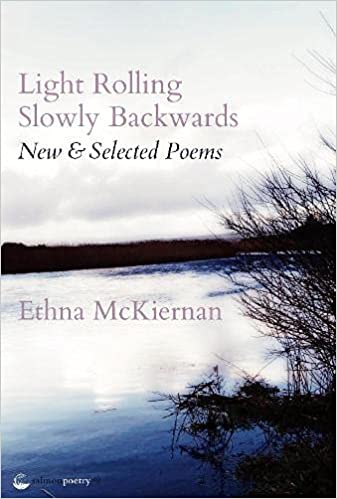| <- Back to main page |
(Salmon Poetry)

Ethna McKiernan, a fixture in Twin Cities poetry for four decades, passed away last December—but not without leaving us a generous paring gift: Light Rolling Slowly Backwards, a collection of new and selected poems. If I had one word to describe this book, it would be: gratitude. To McKiernan, who continued writing her original and heartfelt poems almost to the very end, despite illness, radiation, and a death sentence of cancer. And to her publisher, the excellent Salmon Poetry of Ireland, who rushed to publish Light Rolling Slowly Backwards while its author was still alive.
Like the poetry of Galway Kinnell (who she workshopped with), McKiernan’s verse is casual and earthy, never far from her workaday life but always, somehow, with one foot in the mist. From “Come Back to the World”:
Leave the ruined realm
you inhabited those long years,
where bluebirds’ song was mute
and oceans never surged
and darkness fell by noon.
Raised partly in Ireland, McKiernan’s early poetry is often situated there. She was part of a new wave in Irish-American literature: the rediscovery of the old country. From “Going Back”:
I cannot make my roots take hold;
can only stand and hear the sea
return the poems that you’d willed it
as a child, while the wind
raises ghosts behind me.
In addition to the selection of poems from McKiernan’s first four collections, Light Rolling Slowly Backwards contains twenty-nine new poems (a mini-book in itself) in a section titled Light Takes the Tree. These may be the finest poems Ethna McKiernan ever wrote. Some, such as “Oh, Maria”, are drawn from her job working for a non-profit that helps the homeless:
More days than I’d like
I remember Maria staggering toward me
into the lobby and dying in my arms—
how I was wrong to think we needed to call Detox
rather than the ambulance, how she couldn’t, except
with wild eyes, speak, but shook
and shook and shook.
Other poems dive into memory with a self-depreciating humor, like “Jesse’s Basement, 1968” and “Hey Diddle Diddle”, a poem about parenthood that starts:
Remember how it was then,
the desperate scratch and search
for babysitters who didn’t leave
condoms behind the couch?
The subtle search/couch rhyme here evokes Yeats. Indeed, Ireland was never far from McKiernan’s mind—for many years she ran the Irish Books and Music import business out of St. Paul with her father Eoin McKiernan.
She was an intimate poet but not a confessional one—rather she plucked small twigs and grasses from her own life and used them to ignite a poem like “Storm, Lake Superior”:
If ever I was to fall in love
again, it’s likely not
to be with someone human,
but with a moment just like this one—
a lit expanse of water during storm
And although she mainly wrote in free verse, McKiernan was not above a pantoum or even a villanelle, and both can be found in this Light Rolling Slowly Backwards:
Everything reveals itself in time.
I simply counsel patience when I feel
your soul alive like this so close to mine.
(“In Time”)
The poems in Light Rolling Slowly Backwards intersect with one another at crossways, but then diverge on their own unique path, leaving us something like the map to a medieval city. A city with a big clock. Time is again the theme in the magnificent title poem, set in August:
Light rolls slowly backward now
while days shorten. Our shadows grow.
Keats transformed his own approaching death to a beautiful woman in La Belle Dame sans Merci; McKiernan personifies hers as the approach autumn in Light Rolling Slowly Backward:
That must be what this mourning is,
days away from what’s to come,
even as crickets chirr
their bright summer song.
Love, if I knew you, ever found you—
Some of McKiernan’s rolling light has, fortunately, been recaptured in this book; it shines on for her readers.
- Joel Van Valin